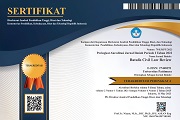The Necessity of Legal Protection for Geographical Indications within a Sui Generis Framework
 ), David Chuah Cee Wei(2)
), David Chuah Cee Wei(2)
(1) Master of Law Student, Faculty of Law, Universitas Brawijaya, Malang, Indonesia

(2) Faculty of Law, Universiti Kebangsaan Malaysia, Selangor, Malaysia
 Corresponding Author
Corresponding Author
Abstract
Introduction: Legal and political activities are inherently interconnected in the pursuit of creating fair and just products for society. This relationship exists because the process of lawmaking, as reflected in statutory regulations, is inseparable from political activity. From an intellectual property perspective, geographical elements can serve both as trademarks and as indicators of a product's regional origin. This dual function creates regulatory overlap between trademark laws and geographical indication protections.
Purposes of the Research: This research was conducted to assess the urgency of establishing a sui generis law for geographical indications.
Methods of the Research: This research is normatively juridical with a statutory approach and a conceptual approach.
Results Main Findings of the Research: The TRIPs Agreement emphasizes that Geographical Indications (GIs) constitute a distinct intellectual property regime, separate from trademarks. The legal policy established in Law Number 20 of 2016 aims to protect both moral and economic rights while preventing violations of communally owned GIs. Substantively, sui generis protection streamlines the registration process for GIs and enhances public participation in their registration and protection, aligning with Indonesia's legal and political direction on GI regulation.Keywords
DOI
10.47268/ballrev.v6i1.2449
Published
2025-03-31
How To Cite
@article{BALLREV2449,
author = {Rohmat Rohmat and David Wei},
title = {The Necessity of Legal Protection for Geographical Indications within a Sui Generis Framework},
journal = {Batulis Civil Law Review},
volume = {6},
number = {1},
year = {2025},
keywords = {Geographical Indications; Legal Politics; Sui Generis.},
abstract = {Introduction: Legal and political activities are inherently interconnected in the pursuit of creating fair and just products for society. This relationship exists because the process of lawmaking, as reflected in statutory regulations, is inseparable from political activity. From an intellectual property perspective, geographical elements can serve both as trademarks and as indicators of a product's regional origin. This dual function creates regulatory overlap between trademark laws and geographical indication protections.Purposes of the Research: This research was conducted to assess the urgency of establishing a sui generis law for geographical indications.Methods of the Research: This research is normatively juridical with a statutory approach and a conceptual approach.Results Main Findings of the Research: The TRIPs Agreement emphasizes that Geographical Indications (GIs) constitute a distinct intellectual property regime, separate from trademarks. The legal policy established in Law Number 20 of 2016 aims to protect both moral and economic rights while preventing violations of communally owned GIs. Substantively, sui generis protection streamlines the registration process for GIs and enhances public participation in their registration and protection, aligning with Indonesia's legal and political direction on GI regulation.},
issn = {2746-8151}, pages = {19--32} doi = {10.47268/ballrev.v6i1.2449},
url = {https://fhukum.unpatti.ac.id/jurnal/ballrev/article/view/2449}
}
Adnyana, Anak Agung Ngurah Tresna. “Perlindungan Hukum Terhadap Produk Indikasi Geografis Dari Tindakan Peniruan.” Jurnal Magister Hukum Udayana 8, no. 1 (2019): 49–60. https://doi.org/10.24843/JMHU.2019.v08.i01.p04.
Agustina, Gusti Ayu Putu Eka, and Taufik Yahya. “Perlindungan Hukum Terhadap Produk Indikasi Geografis Dalam Perspektif Peraturan Perundang-Undangan.” Hangoluan Law Review 1, no. 2 (2022): 204–13.
Ananto, Riana Wulandari, Erna Amalia, and Mohammad Wira Utama. “Politik Hukum Dalam Undang-Undang Number 20 Tahun 2016 Tentang Merek Dan Indikasi Geografis.” SALAM: Jurnal Sosial Dan Budaya Syar-I 10, no. 5 (2023): 1605–16.
Anita. “Politik Hukum Dalam Penegakan Hukum Di Indonesia.” Dharmasisya: Jurnal Program Magister Hukum FHUI 2, no. 1 (2022): 321–34. https://scholarhub.ui.ac.id/dharmasisya/vol2/iss1/25/.
Badan Pembinaan Hukum Nasional. “Hasil Penyelarasan Naskah Akademik RUU Tentang Merek.” Jakarta, 2015. https://bphn.go.id/data/documents/penyelarasan_na_ruu_ttg_merek.pdf.
Benuf, Kornelius, and Muhamad Azhar. “Metodologi Penelitian Hukum Sebagai Instrumen Mengurai Permasalahan Hukum Kontemporer.” Gema Keadilan 7, no. 1 (2020): 20–33. https://doi.org/10.14710/gk.2020.7504.
Dirkareshza, Rianda, and Anni Alvionita Simanjuntak. “Comparative Study of State Jurisdiction: The Protection Towards Geograpichal Indication at Indonesia, the Eu, and Us.” Audito Comparative Law Journal (ACLJ) 4, no. 2 (2023): 96–107. https://doi.org/10.22219/aclj.v4i2.26434.
Fernando, Zico Junius. “Legal Politics Formation of Legislation in the Indonesia National Legal System.” Jurnal Hukum Progresif 10, no. 1 (2022): 25–36. https://doi.org/10.14710/jhp.10.1.25-36.
Hidayat, Arif, and Zaenal Arifin. “Politik Hukum Legislasi Sebagai Socio-Equilbrium Di Indonesia.” Jurnal Ius Constituendum 4, no. 2 (2019): 147–59. https://doi.org/10.26623/jic.v4i2.1654.
Islamiyati, and Dewi Hendrawati. “Analisis Politik Hukum Dan Implementasinya.” Law, Development and Justice Review 2, no. 1 (2019): 104–17. https://doi.org/10.14710/ldjr.v2i1.5139.
Nasrianti, and Muhibuddin. “Perlindungan Hukum Terhadap Indikasi Geografis Menurut Undang-Undang Nomor 20 Tahun 2016 Tentang Merek Dan Indikasi Geografis.” Jurnal Geuthèë: Penelitian Multidisiplin 5, no. 2 (2022): 177–87. https://doi.org/10.52626/jg.v5i2.157.
Nugraha, Yudha Agung, and Imam Haryanto. “Hambatan Pendaftaran Indikasi Geografis Tahu Sumedang Sebagai Aset Potensial Daerah.” Al Education And Development 9, no. 1 (2021): 119–30. https://doi.org/10.37081/ed.v9i1.2306.
Nurhayati, Yati, Ifrani, and M Yasir Said. “Metodologi Normatif Dan Empiris Dalam Perspektif Ilmu Hukum.” Jurnal Penegakan Hukum Indonesia 2, no. 1 (2021): 1–20.
Paul, Ritu. “Intellectual Property Rights: A Utilitarian Perspective.” Available at SSRN, May 9, 2021. https://doi.org/10.2139/ssrn.3842429.
Puteri, Rinda Fitria Tamara, and Budi Santoso. “Urgensi Pemisahan Peraturan Perundangan Indikasi Geografis Dengan Peraturan Perundangan Merek Di Indonesia.” NOTARIUS 16, no. 1 (2023): 48–65. https://doi.org/10.14710/nts.v16i1.38219.
Rahman, Abdul. “Determinasi Politik Pada Proses Pembentukan Dan Penegakan Hukum Di Indonesia.” Al Daulah: Jurnal Hukum Pidana Dan Ketatanegaraan 9, no. 2 (2020): 127–37. https://doi.org/10.24252/ad.v9i2.16085.
Rokilah. “The Role of the Regulations in Indonesia State System.” Ajudikasi : Jurnal Ilmu Hukum 4, no. 1 (2020): 29–38. https://doi.org/10.30656/ajudikasi.v4i1.2216.
Santoso, Agil Febriansyah, and Budi Santoso. “Implementasi Hukum Kekayaan Intelektual Dalam Meningkatkan Kesejahteraan Masyarakat Dalam Perspektif Negara Hukum.” NOTARIUS 15, no. 2 (2022): 818–32. https://doi.org/10.14710/nts.v15i2.33566.
Thohari, A Ahsin. “The Manisfestation of the Rechtsidee of Pancasila in Regulating The Constitutional Rights in Indonesia.” PETITA: Jurnal Kajian Ilmu Hukum Dan Syariah 4, no. 2 (2019): 176–88. https://doi.org/10.22373/petita.v4i2.23.
Yasa, I Wayan Budha. “Penalaran Hukum Dan Konsep Hukum HLA Hart Sebagai Solusi Untuk Meredakan Gejala Antinomi Dalam Penegakan Hukum Di Indonesia.” Jurnal Komunikasi Hukum (JKH) 9, no. 1 (2023): 766–81. https://doi.org/10.23887/jkh.v9i1.57115.| Dublin Core | PKP Metadata Items | Metadata for this Document | |
| 1. | Title | Title of document | The Necessity of Legal Protection for Geographical Indications within a Sui Generis Framework |
| 2. | Creator | Author's name, affiliation, country |
Rohmat Rohmat; Master of Law Student, Faculty of Law, Universitas Brawijaya, Malang; Indonesia  |
| 2. | Creator | Author's name, affiliation, country | David Chuah Cee Wei; Faculty of Law, Universiti Kebangsaan Malaysia, Selangor; Malaysia |
| 3. | Subject | Discipline(s) | |
| 3. | Subject | Keyword(s) | Geographical Indications; Legal Politics; Sui Generis. |
| 4. | Description | Abstract | Introduction: Legal and political activities are inherently interconnected in the pursuit of creating fair and just products for society. This relationship exists because the process of lawmaking, as reflected in statutory regulations, is inseparable from political activity. From an intellectual property perspective, geographical elements can serve both as trademarks and as indicators of a product's regional origin. This dual function creates regulatory overlap between trademark laws and geographical indication protections.Purposes of the Research: This research was conducted to assess the urgency of establishing a sui generis law for geographical indications.Methods of the Research: This research is normatively juridical with a statutory approach and a conceptual approach.Results Main Findings of the Research: The TRIPs Agreement emphasizes that Geographical Indications (GIs) constitute a distinct intellectual property regime, separate from trademarks. The legal policy established in Law Number 20 of 2016 aims to protect both moral and economic rights while preventing violations of communally owned GIs. Substantively, sui generis protection streamlines the registration process for GIs and enhances public participation in their registration and protection, aligning with Indonesia's legal and political direction on GI regulation. |
| 5. | Publisher | Organizing agency, location | Faculty of Law, Universitas Pattimura |
| 6. | Contributor | Sponsor(s) | |
| 7. | Date | (YYYY-MM-DD) | 2025-03-31 |
| 8. | Type | Status & genre | Peer-reviewed Article |
| 8. | Type | Type | |
| 9. | Format | File format | |
| 10. | Identifier | Uniform Resource Identifier | https://fhukum.unpatti.ac.id/jurnal/ballrev/article/view/2449 |
| 10. | Identifier | Digital Object Identifier | 10.47268/ballrev.v6i1.2449 |
| 11. | Source | Title; vol., no. (year) | Batulis Civil Law Review; Vol 6, No 1 (2025): VOLUME 6 ISSUE 1, MARCH 2025 |
| 12. | Language | English=en | en |
| 13. | Relation | Supp. Files | |
| 14. | Coverage | Geo-spatial location, chronological period, research sample (gender, age, etc.) | |
| 15. | Rights | Copyright and permissions | Copyright: Authors who publish their manuscripts in this Journal agree to the following conditions: 1. The copyright in each article belongs to the author, as well as the right to patent. 2. Authors are able to enter into separate, additional contractual arrangements for the non-exclusive distribution of the journal's published version of the work (e.g., post it to an institutional repository or publish it in a book), with an acknowledgment of its initial publication in this journal. 3. Authors are permitted and encouraged to post their work online (e.g., in institutional repositories or on their website) prior to and during the submission process, as it can lead to productive exchanges, as well as earlier and greater citation of published work. 4. Authors have the right to self-archiving of the article (Author Self-Archiving Policy)
Licence : Batulis Civil Law Review Journal is disseminated based on the Creative Commons Attribution-NonCommercial 4.0 International license terms. This license allows anyone to copy and redistribute this material in any form or format, compose, modify, and make derivatives of this material for any purpose. You cannot use this material for commercial purposes. You must specify an appropriate name, include a link to the license, and certify that any changes have been made. You can do this in a way that is appropriate, but does not imply that the licensor supports you or your use.
|
Copyright (c) 2025 Rohmat Rohmat, David Chuah Cee Wei

This work is licensed under a Creative Commons Attribution-NonCommercial 4.0 International License.

 : 1839 times
: 1839 times Download : 1055 times
Download : 1055 times














